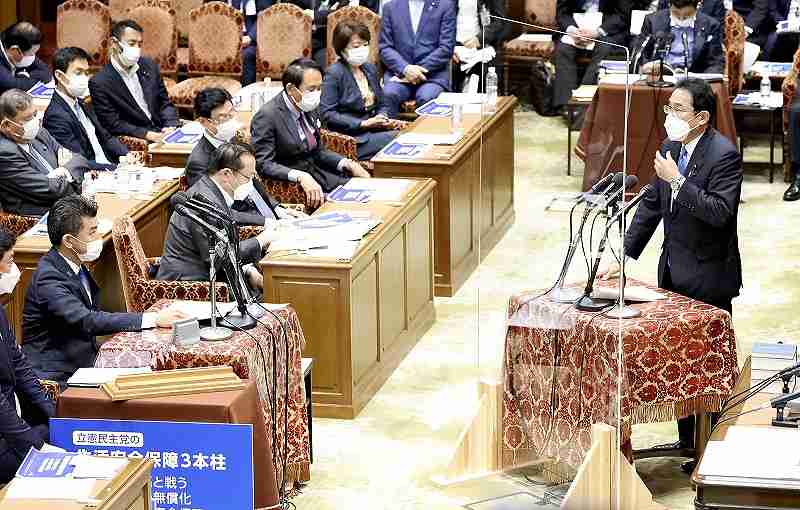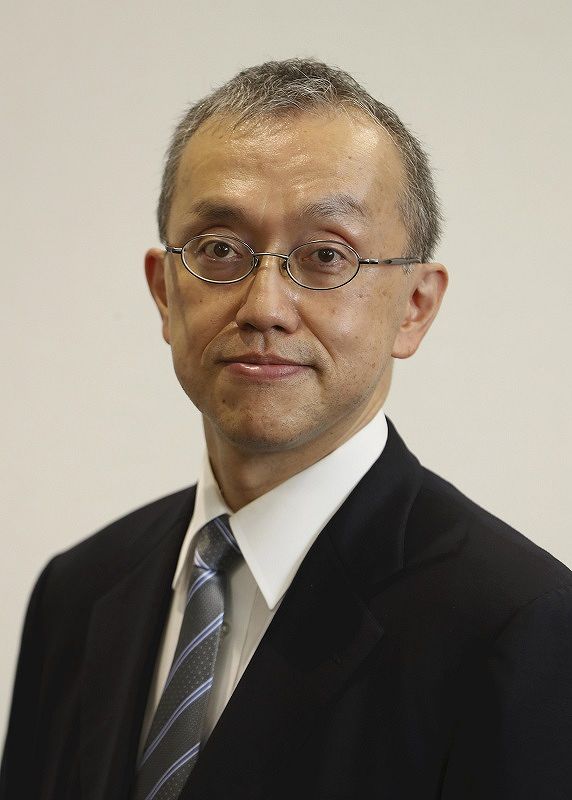Opposition parties must show they have ability to govern

Prime Minister Fumio Kishida, right, responds to questions from Constitutional Democratic Party of Japan leader Kenta Izumi, lower left, on May 26.
8:00 JST, October 1, 2022
As the extraordinary Diet session begins in October, opposition parties will take center stage. They will be questioning Cabinet ministers and government officials to keep a harsh spotlight on the deep relations between the religious group known as the Unification Church and the ruling Liberal Democratic Party. The church is seen as a religious cult, and it has caused many tragedies among its members’ families. One of those victims is the alleged killer of former Prime Minister Shinzo Abe.
Along with controversy over the state funeral held for Abe a few days ago, political offensives by opposition parties have driven down Prime Minister Fumio Kishida’s approval rating. It is likely that a Cabinet minister or an LDP party executive will suffer a huge blow in the Diet debate because of inappropriate involvement with the church. If that happens, the opposition parties will boast that they have corrected a political injustice. Indeed, they will have done an excellent job.
We have seen scenes resembling this before now. Opposition parties have sought out and jumped on scandals and bad deeds of not only the Kishida administration, but of every past administration of the LDP. However, these efforts have not made the opposition into a reliable force in its own right. The opposition parties have lost three lower house elections and four upper house elections in succession. It is obvious that voters have not given much weight to this style of inquiry and attack when considering whom to vote for.
After the long-dominant LDP was established in 1955, the main opposition parties have broken up and regrouped repeatedly. In the first four decades, the largest one was the Social Democratic Party, which was replaced by the New Frontier Party, then the Democratic Party and then, currently, the Constitutional Democratic Party of Japan. Many have been positioned as center-left parties to face off against the conservative LDP.
Looking back on history, the opposition parties have defeated the LDP only four times in 45 elections for the upper or lower house. Their winning rate is about 10%. When we compare this with the center-left parties of other developed countries, we have to say that it is extremely low. In the United States, the Democratic Party has won eight of 17 presidential elections during the same period. Britain’s Labor Party and the Social Democratic Party of Germany have had a winning rate of about 40% in general elections.
The current major opposition parties in Japan are the center-left CDPJ, the center-right Ishin no Kai (Japan Innovation Party), the Democratic Party for the People, and the Japanese Communist Party. The policy differences among them are so critical that they cannot cooperate to build an electoral force equal to the ruling camp of the LDP and its coalition partner Komeito.
A poll conducted in July by The Yomiuri Shimbun showed that 80% of voters say there is a need for an opposition party that can compete with the LDP. But two-thirds thought that the current opposition parties did not have enough implementable policies. Although 63% of respondents want to see a transfer of power to an opposition party at regular intervals, most respondents think it will not become a reality anytime soon.
The voters’ viewpoint regarding the leading opposition party has remained unchanged even when one such party has been replaced by another. Their major shortcoming has been a lack of a realistic national security policy. Because of strong anti-military sentiment among some members, the parties have been unable to form any coherent security policies. These members advocated extreme pacifism even during the Cold War era, when the Soviet Union threatened Japan with its huge armed forces. And they continue to hold such views even now, when China has emerged as a global military power with its intimidating diplomacy.
The Democratic Party, which swept to victory and a change of government in the 2009 general election, soon lost popularity because of its poor handling of the realignment of the U.S. military bases in Okinawa Prefecture. The administration undermined the credibility of the Japan-U.S. alliance, and Prime Minister Yukio Hatoyama was forced to step down.
The opposition faced a predicament after Abe took the reins of government in 2012, going on to become Japan’s longest-serving prime minister. One reason is that the then Democratic Party misjudged Abe’s LDP and thought it had drifted too far right. They asserted that the Democratic Party, not the LDP, was substantively in the moderate mainstream. But Abe’s economic and social policy was far from what the opposition claimed, including such moderate policies as urging society to improve job opportunities for women, which conflicts with the old-fashioned LDP’s family values, or increasing the minimum wage, which had been a key policy of the left. As the LDP had co-opted some of the opposition parties’ policies, the Democratic Party and its successor, the CDPJ, could not take countermeasures, and had no choice but to tilt further to the left, which meant losing the broad support of moderate voters. In fact, the CDPJ had even promoted relations with the far-left JCP, only to lose seats in the lower house election last year, after which the party leadership resigned.
A more severe problem is that the leading opposition party is supported mainly by the elderly and is seen as a party of protecting vested interests. Although they used to be called progressive, they have lost their pro-reform stance of changing the economic and social structure of Japan. It is obvious that the key to winning the confidence of voters is to move away from being a party that merely resists changes to the status quo.
If opposition parties had any other path to power, I suppose it would be a grand coalition with the LDP. Unfortunately, they have lost their few chances to form one. In Japan, this idea has been dismissed because its image is reminiscent of the Imperial Aid Association that supported the all-out-war regime during World War II. But there have been some precedents in democratic European countries. The SDP of Germany and the Labor Party of Britain have taken advantage of grand coalitions. These parties learned how to govern and won the public’s trust.
As such opportunities rarely come by, the opposition, especially the largest party, has a long way to go. Their to-do list includes holding in-depth discussions over national-security problems, brushing up on proactive policies supported by the younger generation, beefing up their weak local organizations, and so on.
If the ruling party fails and loses credibility, the opposition takes its place. This is the regular process of a constitutional democratic government. The two-party system has been an unfulfilled dream in Japan. But it is worth pursuing, as long as the people want it and the opposition strives for self-reform.
Political Pulse appears every Saturday.

Takayuki Tanaka
Tanaka is senior managing director, chief officer, administration, of The Yomiuri Shimbun. His previous post was managing editor.




